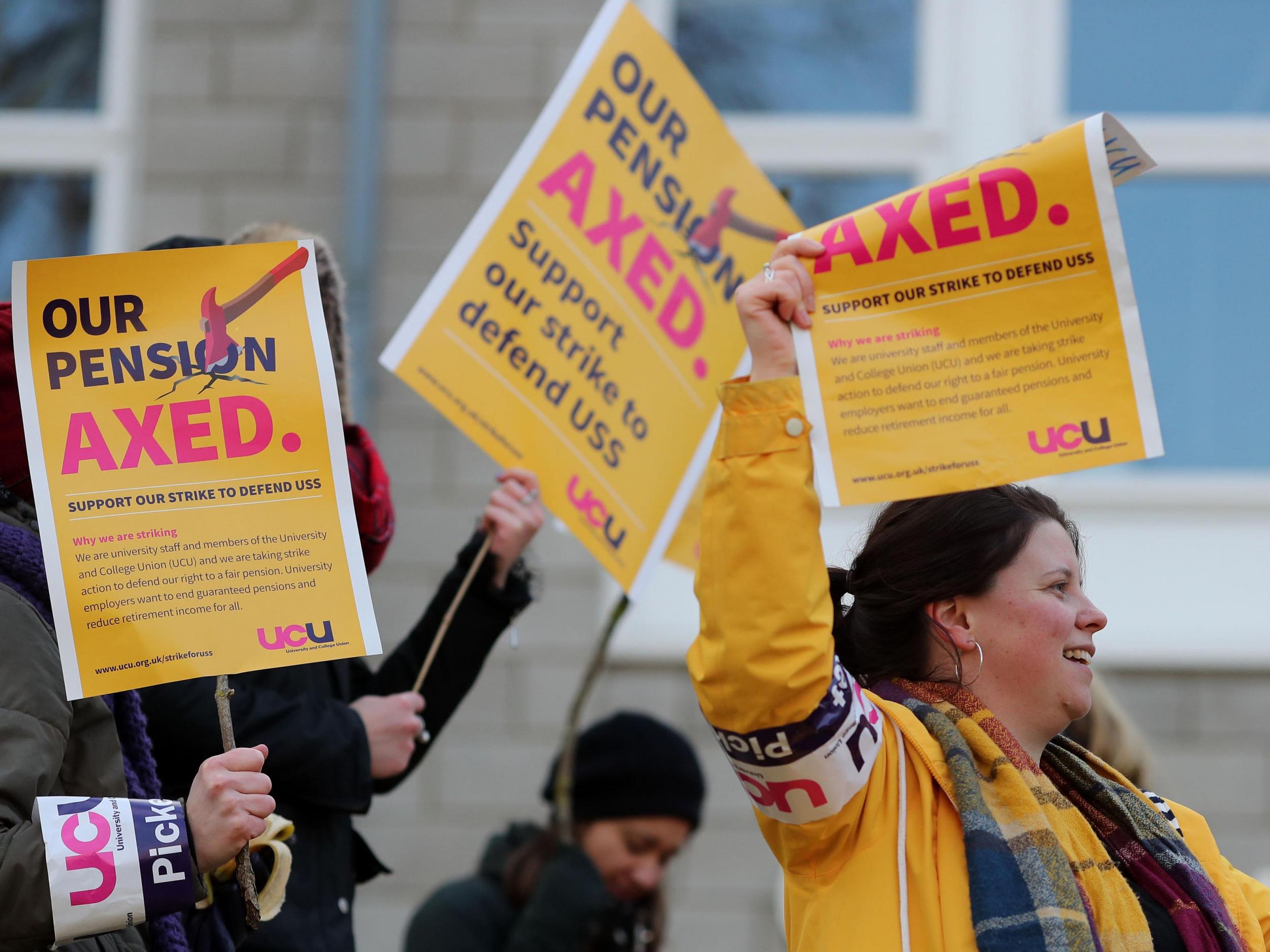Public support is vital but lacking for the university staff strike
The public sector generally enjoys better pension arrangements than most of the private sector, despite the erosions some schemes have suffered

Your support helps us to tell the story
From reproductive rights to climate change to Big Tech, The Independent is on the ground when the story is developing. Whether it's investigating the financials of Elon Musk's pro-Trump PAC or producing our latest documentary, 'The A Word', which shines a light on the American women fighting for reproductive rights, we know how important it is to parse out the facts from the messaging.
At such a critical moment in US history, we need reporters on the ground. Your donation allows us to keep sending journalists to speak to both sides of the story.
The Independent is trusted by Americans across the entire political spectrum. And unlike many other quality news outlets, we choose not to lock Americans out of our reporting and analysis with paywalls. We believe quality journalism should be available to everyone, paid for by those who can afford it.
Your support makes all the difference.That university lecturers are prepared to attend picket lines and sacrifice their pay in one of the bitterest February weeks in recent years is at least testament to the sincerity of their feelings. Their anger at what is happening to their future pensions is perfectly understandable. Indeed, their case is, in fairness, almost unassailable.
To be told, in some cases, late in your career that the pension you once thought you could rely upon will be replaced with an inferior provision is inherently unfair. That is simply because the new pension scheme broadly depending on the performance of world stock markets, many university staff will not have the necessary time to make the most of such an investment model.
You do not require a degree in finance or economics to see that much the best way to invest in the stock market is to make regular contributions over many decades. This will simply be impossible for many. Had they known, a decade or two ago, that the authorities planned to reform the system in this way; they might have been able to make alternative provision while they still had time on their side. Now many do not.
It remains the case, however, that the public sector generally enjoys better pension arrangements than most of the private sector (excluding the top bosses at companies who seem at liberty to pay themselves whatever they wish), despite the erosions some schemes have suffered. That is not a reason to cut public sector pensions (rather than restore defined benefit schemes to the private sector), but it is necessary political context. In the end, the lecturers will depend on public support for their industrial action to be successful, and they need to take account of the fact that many will be unsympathetic to their plight.
The £6bn reported deficit in the universities’ pension scheme is hardly the lecturers’ fault. Indeed, much of it is simply due to the ultra-low interest rate regime followed by the Bank of England since the financial crash – and it has badly affected many private sector defined benefit or final salary schemes too, and contributed to their gradual disappearance in recent times. Still, the universities scheme must be reformed if it is to be sustainable and command public support. This is all the more true as the scandal of vice-chancellors’ vast salaries and perks has been exposed, and some of the excesses of the perks culture in academia have come to light. These archaic practices would be hard to justify in any circumstances; at a time of general pressure on public services and when so many students are leaving university with onerous debts, they are simply obscene.
The law of unintended consequences has also been at work here. One unimagined consequence of the increase in student tuition fees and the boom in overseas students (who pay full, not to say inflated, fees) from places such as China has showered many institutions with funding that they have, in some examples, squandered. Although isolated, there are cases of universities paying thousands of pounds to relocate a pet dog, or to shuttle a vice-chancellor between Bristol and London, or a Fortnum & Mason hamper claimed on exes. There may be sensible explanations for any or all of those – but the “optics”, as they say in PR, are not good.
Rather than invest in their students’ education, the university bosses have paid themselves far too much, or at least failed to justify their remuneration by reference to any convincing benchmark or market conditions. As in so many companies, the middle-ranking lecturers, who are not lavishly rewarded, are suffering because of the selfishness of their bosses. That is why the strike has come about; why it has some justice to it; but also why, through no fault of their own, it may not succeed.
Join our commenting forum
Join thought-provoking conversations, follow other Independent readers and see their replies
Comments